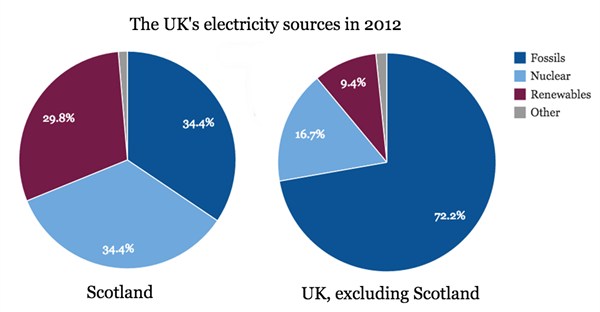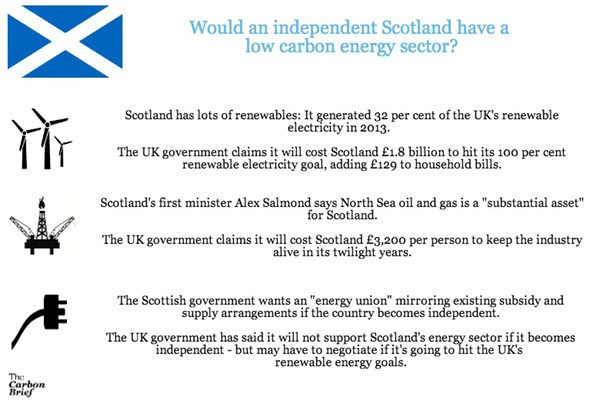Carbon Brief Staff
17.09.2014 | 2:10pmScotland’s voters are set to decide whether the country will separate from the rest of the UK.
Here’s our guide to what might mean for the country’s climate and energy policies.
Scotland would get the lion’s share of North Sea oil and gas tax revenues, but might have to forego some of it to keep the sector going
One of the largest economic prizes at stake in the referendum is North Sea oil and gas.
The Scottish government says Scotland would have a right to 90 per cent of future North sea oil and gas tax revenues. The UK government says it’s more like 73-88 per cent.
The split largely depends on where the maritime border would be drawn. The final boundary would have to be negotiated between an independent Scotland and the rest of the UK.
 Source: HM Government ” Scotland analysis: Borders and citizenship“
Source: HM Government ” Scotland analysis: Borders and citizenship“
It also depends on how much oil is worth in future and how much it costs to extract. In 2012/13 an 84 per cent share of North sea tax revenues was worth £5.6 billion. But future revenues are highly uncertain.
The Scottish government might also have to forego some tax revenues to keep the industry going.
The UK government says it is giving tax breaks worth £20 billion to encourage companies to keep investing in old oil fields. It says the cost per person of these tax breaks would be higher for an independent Scotland. Confusingly, a UK government press release announcing the measure said it wouldn’t cost government a penny and would actually boost tax revenues.
Scotland’s smaller economy would also have to navigate the volatility of the fossil fuel market, with sudden falls in prices cutting government oil and gas tax revenues.
The UK government argues larger economies – like the UK – find it easier to absorb these fluctuations as the potential lost revenue is spread across more people. It says that Scotland would be taking a risk if it becomes independent as it would no longer have the union’s “broad shoulders” to deal with such shocks.
Scotland would not get a £600 billion windfall from North Sea oil and gas
Consultancy N-56, which is funded by a Yes campaign board member, claims there could be around 45 billion barrels of oil and gas remaining worth £665 billion in tax receipts to Scotland. But there’s a couple of things wrong with the calculation.
First, it assumes about twice as much oil and gas can be extracted as other estimates. A major review of the North Sea’s resources conducted by energy magnate Sir Ian Wood for the UK government last year suggested 24 billion barrels could be extractable, at a cost.
It also fails to properly consider the costs of extracting the North Sea’s ever harder to reach resources. N-56 says “new technology” could allow companies to frack underwater and exploit billions more barrels of North Sea oil and gas. But the concept of undersea fracking has been dismissed by a number of academics as “largely nonsense”.
Scotland could export its excess electricity to the rest of the UK, for now
Scotland plans to generate the equivalent of 100 per cent of its electricity from renewables by 2020. To do this it plans to keep nuclear and conventional power plants open, generating more than 100 per cent of its needs in total and exporting the excess to England.
The UK government has said it could simply stop importing expensive Scottish renewable electricity. But it couldn’t do this overnight because it needs the power to keep the lights on. Scotland supplies 4.6 per cent of demand in England and Wales.
Plans to boost interconnector capacity across the channel would allow England to increase imports from the continent a bit, while plans to link up with Norway would further boost potential. But both will take time.
So it’s likely Scotland would be able to continue exporting excess electricity south in the short term. Discussions about a potential long-term ‘energy union’ would have to take place after the referendum.
Scotland’s emissions might fall, but it plans to ship lots of carbon pollution abroad
Scotland’s electricity mix is much greener than the rest of the UK, as these graphs show:

Source: DECC electricity generation and supply figures for the home nations, 2012
The Scottish government says its renewable electricity share has already risen to 46 per cent. Scotland has 43 per cent of the UK’s wind capacity and pumps out 92 per cent of its hydroelectric power, and is set to continue to dominate renewables production on these islands, reflecting its abundant resources of wind and space.
That should help it hit its target of cutting emissions by 80 per cent compared to 1990 levels by 2050. It currently shares that goal with the UK. But the target is also enshrined in an exclusively Scottish law, the Climate Change (Scotland) Act of 2009, which sets more demanding interim targets for 2020.
Such emissions cuts could come at a cost, however. Scotland currently gets 28 per cent of the UK’s renewable electricity subsidy, despite only having eight per cent of the population.
If it becomes independent, Scotland might have to pay its own renewables subsidies. The UK government suggests Scotland would have to raise £1.8 billion to hit its 100 per cent renewables goal.
Others argue the rest of the UK would have to share this bill, as it will need green energy imports from Scotland to meet EU targets. This is another area of uncertainty and would be tied up in any negotiations over Scottish entry to the EU as a nation in its own right.
It’s also clear that Alex Salmond is committed to extracting every last drop of North Sea oil and gas, a position he shares with David Cameron.
These carbon intensive resources would be shipped elsewhere to be burned, meaning they wouldn’t count towards Scotland’s emissions. Nonetheless, it suggests Scotland isn’t exactly poised to become a climate change leader, despite its considerable renewables potential.

Infographic created using Piktochart
For more on this issue
See our previous analyses:
- Could an independent Scotland deliver a low carbon future?
- Scottish Independence: How would we divide up our oil, wind and gas?
- What climate change policy could mean for Scottish independence and the future of North Sea oil
- Why undersea fracking is unlikely to give Scotland a £600 billion windfall
Greenpeace’s Energydesk also has two politicians arguing over whether the climate would be better off with a vote for or against independence.

